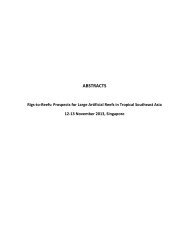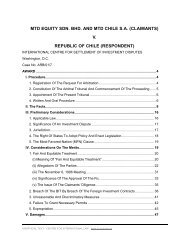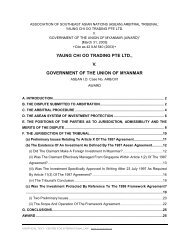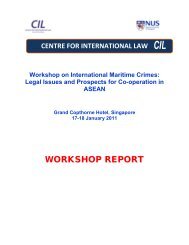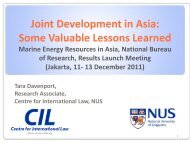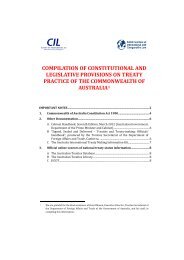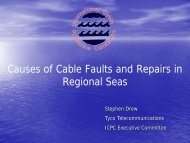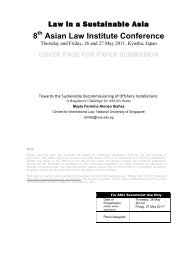Military Activities in the EEZ: Legal Issues - Centre for International ...
Military Activities in the EEZ: Legal Issues - Centre for International ...
Military Activities in the EEZ: Legal Issues - Centre for International ...
You also want an ePaper? Increase the reach of your titles
YUMPU automatically turns print PDFs into web optimized ePapers that Google loves.
RSIS–OPRF <strong>International</strong> Conference<br />
28-29 February 2012 Mar<strong>in</strong>a Mandar<strong>in</strong><br />
Security Environment of <strong>the</strong> Seas <strong>in</strong> East Asia<br />
Session 5. <strong>Legal</strong> Aspects of <strong>the</strong> <strong>EEZ</strong><br />
<strong>Military</strong> <strong>Activities</strong> <strong>in</strong> <strong>the</strong> <strong>EEZ</strong>:<br />
<strong>Legal</strong> <strong>Issues</strong><br />
Robert Beckman<br />
Director, <strong>Centre</strong> <strong>for</strong> <strong>International</strong> Law<br />
1
Outl<strong>in</strong>e of Presentation<br />
1. Key Provisions of <strong>EEZ</strong> Regime<br />
2. <strong>Military</strong> <strong>Activities</strong> <strong>in</strong> <strong>the</strong> <strong>EEZ</strong><br />
3. Due Regard Obligation<br />
4. <strong>EEZ</strong> <strong>Activities</strong> and UNCLOS Dispute Settlement<br />
5. Conclusions
Part 1<br />
Key Provisions of <strong>EEZ</strong> Regime
History of <strong>EEZ</strong> Regime<br />
• Was a result of a compromise at <strong>the</strong> Third UNCLOS<br />
• Territorialist States wanted a 200 nm territorial sea, subject<br />
to exceptions <strong>for</strong> rights and freedoms of o<strong>the</strong>r States<br />
• Maritime powers wanted <strong>the</strong> zone to rema<strong>in</strong> high seas,<br />
subject to exceptions <strong>for</strong> coastal States over resources<br />
• Result was agreement on <strong>the</strong> <strong>EEZ</strong> - a new sui generis zone<br />
called a “specific legal regime”
Nature of <strong>EEZ</strong> Regime<br />
• <strong>EEZ</strong> is a maritime zone beyond and adjacent to <strong>the</strong><br />
territorial sea, extend<strong>in</strong>g out to 200 nautical miles from <strong>the</strong><br />
basel<strong>in</strong>es from which <strong>the</strong> territorial sea is measured<br />
• <strong>EEZ</strong> is not part of <strong>the</strong> high seas<br />
• <strong>EEZ</strong> is not subject to <strong>the</strong> sovereignty of coastal State<br />
• <strong>EEZ</strong> is a specific legal regime <strong>in</strong> which <strong>the</strong> rights and<br />
jurisdiction of coastal States and <strong>the</strong> rights and freedoms of<br />
o<strong>the</strong>r States are set out <strong>in</strong> <strong>the</strong> Convention
Overview of <strong>EEZ</strong> Regime<br />
• Article 55 – Specific <strong>Legal</strong> Regime<br />
• Article 56 - Rights, Jurisdiction & Duties of Coastal States<br />
• Article 58 - Rights and Duties of O<strong>the</strong>r States<br />
• Article 59 – Basis <strong>for</strong> resolution of conflicts regard<strong>in</strong>g <strong>the</strong><br />
Attribution of Rights and Jurisdiction <strong>in</strong> <strong>the</strong> <strong>EEZ</strong>
Article 56 – Rights of Coastal State<br />
In <strong>the</strong> <strong>EEZ</strong>, <strong>the</strong> coastal State has:<br />
(a) sovereign rights <strong>for</strong> <strong>the</strong> purpose of explor<strong>in</strong>g and<br />
exploit<strong>in</strong>g, conserv<strong>in</strong>g and manag<strong>in</strong>g <strong>the</strong> natural<br />
resources, whe<strong>the</strong>r liv<strong>in</strong>g or non-liv<strong>in</strong>g, of <strong>the</strong> waters<br />
superjacent to <strong>the</strong> seabed and of <strong>the</strong> seabed and its<br />
subsoil,<br />
and with regard to o<strong>the</strong>r activities <strong>for</strong> <strong>the</strong> economic<br />
exploitation and exploration of <strong>the</strong> zone, such as <strong>the</strong><br />
production of energy from <strong>the</strong> water, currents and w<strong>in</strong>ds;<br />
(c) o<strong>the</strong>r rights and duties provided <strong>for</strong> <strong>in</strong> this<br />
Convention.
Article 56 – Jurisdiction of Coastal State<br />
In <strong>the</strong> <strong>EEZ</strong>, <strong>the</strong> coastal State has:<br />
(b) jurisdiction as provided <strong>for</strong> <strong>in</strong> <strong>the</strong> relevant<br />
provisions of this Convention with regard to:<br />
(i) <strong>the</strong> establishment and use of artificial islands,<br />
<strong>in</strong>stallations and structures; [Part VI]<br />
(ii) mar<strong>in</strong>e scientific research; [Part XII]<br />
(iii) <strong>the</strong> protection and preservation of <strong>the</strong> mar<strong>in</strong>e<br />
environment; [Part XII]
Article 56 – Due Regard Obligation<br />
2. In exercis<strong>in</strong>g its rights and per<strong>for</strong>m<strong>in</strong>g its duties<br />
under this Convention <strong>in</strong> <strong>the</strong> <strong>EEZ</strong>,<br />
<strong>the</strong> coastal State shall have due regard to <strong>the</strong> rights<br />
and duties of o<strong>the</strong>r States<br />
and shall act <strong>in</strong> a manner compatible with <strong>the</strong><br />
provisions of this Convention.
Article 58 – Rights and Duties O<strong>the</strong>r<br />
States <strong>in</strong> <strong>the</strong> <strong>EEZ</strong><br />
1. In <strong>the</strong> <strong>EEZ</strong>, all States, . . enjoy, subject to <strong>the</strong><br />
relevant provisions of this Convention, <strong>the</strong> freedoms<br />
referred to <strong>in</strong> article 87 of navigation and overflight<br />
and of <strong>the</strong> lay<strong>in</strong>g of submar<strong>in</strong>e cables and pipel<strong>in</strong>es,<br />
and o<strong>the</strong>r <strong>in</strong>ternationally lawful uses of <strong>the</strong> sea<br />
related to <strong>the</strong>se freedoms, such as those associated<br />
with <strong>the</strong> operation of ships, aircraft and submar<strong>in</strong>e<br />
cables and pipel<strong>in</strong>es, and compatible with <strong>the</strong> o<strong>the</strong>r<br />
provisions of this Convention.
Part 2<br />
<strong>Military</strong> <strong>Activities</strong> <strong>in</strong> <strong>the</strong> <strong>EEZ</strong>
Article 58 – Position of US on “o<strong>the</strong>r<br />
<strong>in</strong>ternationally lawful uses”<br />
• Position of <strong>the</strong> United States – <strong>the</strong> phrase “o<strong>the</strong>r<br />
<strong>in</strong>ternationally lawful uses <strong>in</strong> Article 58(1) .. . was<br />
<strong>in</strong>tended to preserve <strong>in</strong> <strong>the</strong> <strong>EEZ</strong> <strong>the</strong> freedom to use <strong>the</strong><br />
high seas <strong>for</strong> military purposes
Article 87. Freedom of <strong>the</strong> High Seas<br />
Article. 87. Freedom of <strong>the</strong> high seas<br />
1.. . Freedom of <strong>the</strong> high seas is exercised under <strong>the</strong> conditions<br />
laid down by this Convention and by o<strong>the</strong>r rules of <strong>in</strong>ternational<br />
law. It comprises, <strong>in</strong>ter alia, both <strong>for</strong> coastal and land-locked<br />
States:<br />
(a) freedom of navigation;<br />
(b) freedom of overflight; etc<br />
Note: Although Article 87 does not expressly provide that military<br />
activities are <strong>in</strong>cluded <strong>in</strong> freedom of high seas, but it is argued that<br />
it was <strong>in</strong>tended to be <strong>in</strong>cluded <strong>in</strong> “<strong>in</strong>ter alia”
Controversy on “o<strong>the</strong>r <strong>in</strong>ternationally<br />
lawful uses”<br />
• Some States take <strong>the</strong> position that not all military activities are<br />
preserved by article 58(1)<br />
• Some argue that coastal States could oppose military activities<br />
<strong>in</strong>volv<strong>in</strong>g weapons that may harm <strong>the</strong> liv<strong>in</strong>g resources or <strong>the</strong> mar<strong>in</strong>e<br />
environment or endanger offshore <strong>in</strong>stallations, <strong>the</strong> safety of<br />
navigation or <strong>the</strong> conduct of scientific research<br />
• Issue is whe<strong>the</strong>r coastal State can limit <strong>the</strong>se such military<br />
activities by its laws and regulations, given <strong>the</strong> limits on its<br />
jurisdiction <strong>in</strong> article 56
Arts 56 & 73– Jurisdiction of Coastal State<br />
Article 56. In <strong>the</strong> <strong>EEZ</strong>, <strong>the</strong> coastal State has:<br />
(b) jurisdiction as provided <strong>for</strong> <strong>in</strong> <strong>the</strong> relevant provisions of this<br />
Convention with regard to:<br />
(i) <strong>the</strong> establishment and use of artificial islands,<br />
<strong>in</strong>stallations and structures; [Arts. 60, 80, 87, 147, 208,<br />
214, 246, 259]<br />
(ii) mar<strong>in</strong>e scientific research; [Arts 87, 238-265, 297]<br />
(iii) <strong>the</strong> protection and preservation of <strong>the</strong> mar<strong>in</strong>e<br />
environment; [Arts 192-237]<br />
Article 73 gives coastal State jurisdiction to en<strong>for</strong>ce its laws and<br />
regulations on fish<strong>in</strong>g
Article 58(2) – High Seas Rules <strong>in</strong> <strong>EEZ</strong><br />
• Article 58(2) provides that Articles 88 to 115 and o<strong>the</strong>r pert<strong>in</strong>ent<br />
rules of <strong>in</strong>ternational law apply to <strong>the</strong> <strong>EEZ</strong> <strong>in</strong> so far as <strong>the</strong>y are not<br />
<strong>in</strong>compatible with this Part.<br />
• Note: Articles 88-115 <strong>in</strong>clude:<br />
– Art. 88. Reservation of High Seas <strong>for</strong> Peaceful Purposes<br />
– Art. 92. Exclusive jurisdiction of <strong>the</strong> flag state<br />
– Art. 95. Immunity of warships<br />
– Arts. 101-109 Piracy regime
Article 58 Limitations – Due Regard and<br />
Laws of Coastal State<br />
3. In exercis<strong>in</strong>g <strong>the</strong>ir rights and per<strong>for</strong>m<strong>in</strong>g <strong>the</strong>ir duties<br />
under this Convention <strong>in</strong> <strong>the</strong> <strong>EEZ</strong>, States<br />
shall have due regard to <strong>the</strong> rights and duties of <strong>the</strong><br />
coastal State and<br />
shall comply with <strong>the</strong> laws and regulations adopted by <strong>the</strong><br />
coastal State <strong>in</strong> accordance with <strong>the</strong> provisions of this<br />
Convention and o<strong>the</strong>r rules of <strong>in</strong>ternational law <strong>in</strong> so far<br />
as <strong>the</strong>y are not <strong>in</strong>compatible with this Part.
Article 87 Limitation – Due Regard <strong>for</strong><br />
<strong>in</strong>terests of o<strong>the</strong>r States<br />
Article 87. Freedom of <strong>the</strong> high seas<br />
1. The high seas are open to all States, whe<strong>the</strong>r coastal or land-locked.<br />
Freedom of <strong>the</strong> high seas is exercised under <strong>the</strong> conditions laid down<br />
by this Convention and by o<strong>the</strong>r rules of <strong>in</strong>ternational law.<br />
It comprises, <strong>in</strong>ter alia, both <strong>for</strong> coastal and land-locked States:<br />
(a) freedom of navigation;<br />
(b) freedom of overflight; . . .<br />
2. These freedoms shall be exercised by all States with due regard <strong>for</strong> <strong>the</strong><br />
<strong>in</strong>terests of o<strong>the</strong>r States <strong>in</strong> <strong>the</strong>ir exercise of <strong>the</strong> freedom of <strong>the</strong> high<br />
seas, and also with due regard <strong>for</strong> <strong>the</strong> rights under this Convention<br />
with respect to activities <strong>in</strong> <strong>the</strong> Area.
Article 88. Peaceful Purposes<br />
• Article 88 provides that: “The high seas shall be reserved <strong>for</strong><br />
peaceful purposes.”<br />
• Article 88 applies <strong>in</strong> <strong>the</strong> <strong>EEZ</strong> because of Article 58(2)<br />
• Debates on mean<strong>in</strong>g of peaceful purposes:<br />
1. Prohibits all military activities<br />
2. Prohibits all aggressive military activities<br />
3. Prohibits military activities not consistent with UN Charter and<br />
o<strong>the</strong>r obligations under <strong>in</strong>ternational law
Article 300. Good faith & abuse of rights<br />
• Article 300 states that:<br />
States Parties shall fulfil <strong>in</strong> good faith <strong>the</strong> obligations<br />
assumed under this Convention and shall exercise <strong>the</strong><br />
rights, jurisdiction and freedoms recognized <strong>in</strong> this<br />
Convention <strong>in</strong> a manner which would not constitute an<br />
abuse of right.<br />
• Some observers argue that certa<strong>in</strong> types of military<br />
reconnaissance are an abuse of <strong>the</strong> rights of navigation<br />
and overflight (or right to engage <strong>in</strong> military activities)
Summary of Limitations on <strong>Military</strong><br />
<strong>Activities</strong> <strong>in</strong> <strong>the</strong> <strong>EEZ</strong><br />
1. Must be exercised with due regard to <strong>the</strong> rights and duties of <strong>the</strong><br />
coastal State (but not <strong>in</strong>terests)<br />
2. Must comply with laws and regulations of <strong>the</strong> coastal State<br />
adopted <strong>in</strong> accordance with <strong>the</strong> provisions of <strong>the</strong> Convention<br />
3. Must be exercised with due regard to <strong>the</strong> <strong>in</strong>terests of o<strong>the</strong>r States<br />
<strong>in</strong> exercis<strong>in</strong>g high seas freedoms <strong>in</strong> <strong>the</strong> <strong>EEZ</strong> (Article 87)<br />
4. Must not be exercised <strong>in</strong> such a manner that it would constitute<br />
an abuse of rights<br />
5. Must be <strong>for</strong> peaceful purposes
Part 3<br />
Due Regard Obligation
Controversy over Article 58 – Position of US<br />
State Dept<br />
• <strong>Military</strong> activities, such as anchor<strong>in</strong>g, launch<strong>in</strong>g and<br />
land<strong>in</strong>g of aircraft, operat<strong>in</strong>g military devices,<br />
<strong>in</strong>telligence collection, exercises, operations and<br />
conduct<strong>in</strong>g military surveys are recognized historic<br />
high seas uses that are preserved by article 58
Controversy over Article 58 –<br />
Position of US State Dept<br />
• Under article 58(1), all States have <strong>the</strong> right to conduct military<br />
activities with<strong>in</strong> <strong>the</strong> <strong>EEZ</strong>,<br />
but may only do so consistently with <strong>the</strong> obligation to have due<br />
regard to coastal State resource and o<strong>the</strong>r rights, as well as <strong>the</strong><br />
rights of o<strong>the</strong>r States as set <strong>for</strong>th <strong>in</strong> <strong>the</strong> Convention.<br />
• It is <strong>the</strong> duty of <strong>the</strong> flag State, not <strong>the</strong> right of <strong>the</strong> coastal State,<br />
to en<strong>for</strong>ce this "due regard" obligation.
Due Regard Obligation<br />
•Is a procedural duty on both coastal States and o<strong>the</strong>r States to take<br />
<strong>in</strong>to consideration each o<strong>the</strong>r’s legitimate rights under UNCLOS<br />
•Is “an express recognition of <strong>the</strong> general need <strong>for</strong> <strong>the</strong><br />
accommodation of uses” and <strong>in</strong>volves a “balanc<strong>in</strong>g” of <strong>the</strong> rights,<br />
jurisdiction and duties of <strong>the</strong> coastal State with <strong>the</strong> rights and duties<br />
of o<strong>the</strong>r States <strong>in</strong> <strong>the</strong> <strong>EEZ</strong>
Due Regard Obligation<br />
•Can argue that due regard obligation means that<br />
nei<strong>the</strong>r <strong>the</strong> rights of coastal States or o<strong>the</strong>r States are<br />
absolute<br />
•Coastal State has no power to prohibit activities<br />
•User State has no right to act unilaterally<br />
•Due regard obligation is a procedural obligation which<br />
requires <strong>the</strong> two States to consult each o<strong>the</strong>r and<br />
negotiate <strong>in</strong> good faith
Controversy over Article 58 – Query<br />
over “due regard” obligation<br />
• Does due regard obligation <strong>in</strong> article 58 require <strong>the</strong> user<br />
State to consult and negotiate with <strong>the</strong> coastal State or<br />
o<strong>the</strong>r States be<strong>for</strong>e conduct<strong>in</strong>g military or survey<br />
activities <strong>in</strong> its <strong>EEZ</strong> ?<br />
• Consult coastal State if <strong>the</strong> particular use is a threat to <strong>the</strong><br />
resource rights or o<strong>the</strong>r rights of coastal State <strong>in</strong> <strong>EEZ</strong><br />
• Consult o<strong>the</strong>r States if <strong>the</strong> use is threat to <strong>the</strong> <strong>in</strong>terests of<br />
o<strong>the</strong>r States <strong>in</strong> exercis<strong>in</strong>g high seas freedoms <strong>in</strong> <strong>the</strong> <strong>EEZ</strong>
Part 4<br />
<strong>EEZ</strong> <strong>Activities</strong> and<br />
UNCLOS Dispute Settlement
UNCLOS Part XV<br />
• General Pr<strong>in</strong>ciple is that any dispute between States Parties<br />
over <strong>the</strong> <strong>in</strong>terpretation or application of any provision <strong>in</strong> <strong>the</strong><br />
Convention is subject to <strong>the</strong> system of compulsory b<strong>in</strong>d<strong>in</strong>g<br />
dispute settlement (CBDS) <strong>in</strong> section 2 of Part XV<br />
• Because <strong>the</strong> provision on <strong>the</strong> <strong>EEZ</strong> was controversial, it was<br />
specifically provided <strong>in</strong> Article 297(1) that certa<strong>in</strong> categories of<br />
disputes relat<strong>in</strong>g to <strong>the</strong> sovereign rights of <strong>the</strong> coastal State <strong>in</strong><br />
its <strong>EEZ</strong> would be subject to section 2
Article 297(1)<br />
• 1. Disputes concern<strong>in</strong>g <strong>the</strong> <strong>in</strong>terpretation or<br />
application of this Convention with regard to <strong>the</strong><br />
exercise by a coastal State of its sovereign rights or<br />
jurisdiction provided <strong>for</strong> <strong>in</strong> this Convention shall be<br />
subject to <strong>the</strong> procedures provided <strong>for</strong> <strong>in</strong> section 2 <strong>in</strong><br />
<strong>the</strong> follow<strong>in</strong>g cases:
Article 297(1)(a)<br />
• (a) when it is alleged that a coastal State has acted <strong>in</strong><br />
contravention of <strong>the</strong> provisions of this Convention <strong>in</strong><br />
regard to <strong>the</strong> freedoms and rights of navigation,<br />
overflight or <strong>the</strong> lay<strong>in</strong>g of submar<strong>in</strong>e cables and<br />
pipel<strong>in</strong>es, or <strong>in</strong> regard to o<strong>the</strong>r <strong>in</strong>ternationally lawful<br />
uses of <strong>the</strong> sea specified <strong>in</strong> article 58;
Article 297(1)(b)<br />
• (b) when it is alleged that a State <strong>in</strong> exercis<strong>in</strong>g <strong>the</strong><br />
a<strong>for</strong>ementioned freedoms, rights or uses has acted <strong>in</strong><br />
contravention of this Convention or of laws or<br />
regulations adopted by <strong>the</strong> coastal State <strong>in</strong><br />
con<strong>for</strong>mity with this Convention and o<strong>the</strong>r rules of<br />
<strong>in</strong>ternational law not <strong>in</strong>compatible with this<br />
Convention; or
Dispute Settlement & <strong>Military</strong><br />
<strong>Activities</strong><br />
Article 298 – Optional exceptions to <strong>the</strong> system of<br />
compulsory b<strong>in</strong>d<strong>in</strong>g dispute settlement<br />
• States may declare that <strong>the</strong>y do not accept <strong>the</strong><br />
dispute settlement procedures with respect to <strong>the</strong><br />
follow<strong>in</strong>g categories of disputes:<br />
• disputes concern<strong>in</strong>g military activities, <strong>in</strong>clud<strong>in</strong>g<br />
military activities by government vessels and<br />
aircraft engaged <strong>in</strong> non-commercial service, . . .
Declarations under Article 298<br />
• Russian Federation – Declaration under 298 upon ratification<br />
(12 March 1997)<br />
• United K<strong>in</strong>gdom – Declaration upon accession<br />
(7 April 2003)<br />
• Republic of Korea – Declaration made after ratification<br />
(18 April 2006)<br />
• Ch<strong>in</strong>a - Declaration under 298 made after ratification<br />
(25 August 2006)
Option <strong>for</strong> o<strong>the</strong>r States ?<br />
• States parties that have not made declarations under article<br />
298 could provoke a “dispute” on military activities <strong>in</strong> <strong>the</strong> <strong>EEZ</strong><br />
and <strong>in</strong>voke <strong>the</strong> compulsory b<strong>in</strong>d<strong>in</strong>g dispute settlement system<br />
<strong>in</strong> UNCLOS<br />
• An arbitral or judicial decision would strictly speak<strong>in</strong>g be<br />
b<strong>in</strong>d<strong>in</strong>g only on <strong>the</strong> parties to <strong>the</strong> dispute, but <strong>the</strong> decision<br />
would carry great weight as an “authoritative <strong>in</strong>terpretation” of<br />
UNCLOS
ITLOS Advisory Op<strong>in</strong>ion?<br />
• Is it possible to request an ITLOS advisory op<strong>in</strong>ion on legal<br />
issues concern<strong>in</strong>g military activities <strong>in</strong> <strong>the</strong> <strong>EEZ</strong>?<br />
• Article 138 of <strong>the</strong> Rules of <strong>the</strong> Tribunal provides that <strong>the</strong> Tribunal<br />
may give an advisory op<strong>in</strong>ion on a legal question if an<br />
<strong>in</strong>ternational agreement related to <strong>the</strong> purposes of <strong>the</strong><br />
Convention specifically provides <strong>for</strong> <strong>the</strong> submission to <strong>the</strong><br />
Tribunal of a request <strong>for</strong> an advisory op<strong>in</strong>ion.
Part 5<br />
Conclusions
General Conclusions<br />
1. Article 58 was <strong>in</strong>tended to preserve <strong>the</strong> right to conduct<br />
military activities <strong>in</strong> <strong>the</strong> <strong>EEZ</strong><br />
2. There is no agreement on what limitations <strong>the</strong>re are on States<br />
when conduct<strong>in</strong>g military activities <strong>in</strong> <strong>the</strong> <strong>EEZ</strong><br />
3. It can be argued that <strong>the</strong> “due regard” obligation imposes a<br />
limit on user States to consult and negotiate<br />
4. Although it is unlikely that any major power would be will<strong>in</strong>g<br />
to take <strong>the</strong> issue to dispute settlement under UNCLOS, it may<br />
be possible <strong>for</strong> o<strong>the</strong>r States to ei<strong>the</strong>r <strong>in</strong>voke <strong>the</strong> CBDS system<br />
or request an Advisory Op<strong>in</strong>ion



